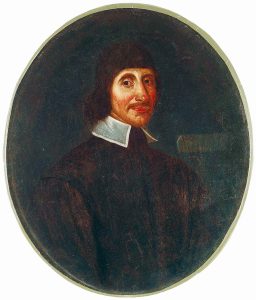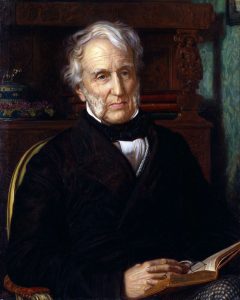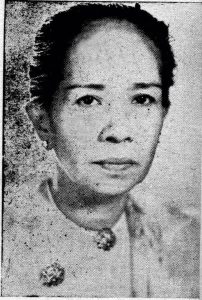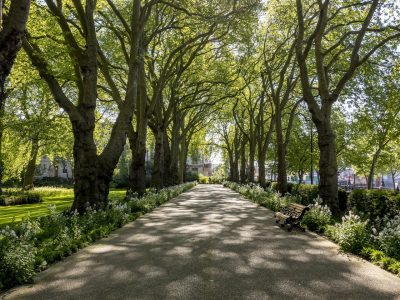
Timeline
1524
Thomas Audley, Baron Audley of Walden (1488–1544) was created a Bencher of The Inner Temple. He was the first member of the Inn to be appointed Lord Chancellor.
Audley was admitted to the Inn in 1514 and quickly ascended the political ladder as a loyal servant of Henry VIII, assisting him with his divorce from Catherine of Aragon and his separation from the Catholic Church. These moves eventually resulted in the establishment of the monarch as the Head of the English Church.
In 1524, Audley was elected as MP for Colchester where he became a strong supporter of Cardinal Wolsey. He was appointed Attorney General in 1526 and Speaker of the House of Commons in 1529. He was an enthusiastic advocate of Henry VIII’s anti-papal policies which ultimately abolished the papal jurisdiction in England. In 1531, he become Serjeant-at-law and he was appointed King’s Serjeant and Lord Chancellor in 1533, in which role he prosecuted Anne Boleyn for her alleged adultery and was present on the scaffold of her execution. He led the cases against Bishop John Fisher and Sir Thomas More, both of whom were executed for refusing to repudiate papal supremacy.
In 1537, Audley condemned to death those who had participated in the Pilgrimage of Grace, a rebellion in the north of England where loyalties to the old Roman Catholic religion remained strong.
In 1541, he participated in the interrogation of Henry’s fifth wife, Catherine Howard, who was found guilty of adultery. She was executed in 1542.
He died in 1544. Thomas Fuller (Worthies of England, 1662) describes Audley and his black marble tomb in St Mary’s Church, Saffron Walden. “Not blacker than the soul, or harder than the heart, of the man whose bones lie beneath it”.
Audley’s renown as a man of few scruples grew after his death. His own words perhaps sum him up more succinctly: “If I had done nothing I had not been seen; if I had done much I had not been suffered”.

1624
The admission of John Winthrop the Younger (1606 – 1676) scientist, astrologer, alchemist, politician, physician and lawyer. He was the eldest son of the first Governor of Massachusetts, John Winthrop the Elder. He was the founder of New London in Connecticut and became Governor of the Connecticut Colony in 1657. Such was his popularity and strength of leadership he was re-elected every year until 1676.
Upon his arrival in Boston in 1631 he was elected as an Assistant to the Massachusetts Bay Colony. He established a settlement at Agawam, later renamed Ipswich, and he was subsequently commissioned to establish a colony on the banks of the Connecticut river which he named Saybrook.
The Massachusetts Bay Colony and Saybrook sided with the Narragansett and Mohegan in a war with the Pequots of eastern Connecticut in 1637, wiping out much of the tribe. Winthrop was given Fisher’s Island and he founded another settlement on the mainland which became New London.
The Connecticut colonies were founded during the interregnum and therefore lacked any official royal patronage or endorsement. John Winthrop travelled to England as the agent for the colony and obtained a Royal Charter in 1662 with the help of a network of royalist friends.
Winthrop founded the first ironworks in Massachusetts in 1633 and he experimented in the extraction of a salt from sea water by evaporation. His scientific curiosity was wide-ranging, and he became the first colonial member of the Royal Society in 1661. He presented his own papers on the subjects of maize, tar and pitch production and he arranged for many zoological specimens to be transferred to England from the New World for the interest of Charles II.
Winthrop also worked as a physician (largely self-taught) and devoted much time and energy to travelling around his colony and treating patients.
His enquiring mind rose to the stars, and he took delivery of a telescope measuring three feet and six inches. With this, he claimed to have viewed a fifth moon of Jupiter, a fact that was only definitively established in 1892 by Edward Barnard of the Lick Observatory.
John Winthrop the Younger died in 1676 and was buried beside his father in Boston.

1724 Accounts
The Inn’s account and receipt books date back to the early 17th century and reveal the daily concerns of the Inn and necessary expenditure. One source of expense was the payment for the Temple foundlings, infants deposited at the Inn. The Benchers kindly undertook responsibility for their upkeep, employing wet nurses and arranging for their apprenticeship to local businesses at around the age of eight or nine years old. Many of these infants died in infancy and were buried in the churchyard. The register of baptism shows that in all 251 foundlings were baptised; 198 appear in the burial registers. The surname given to the infants was Temple or Templer.
Account Book 1719–1724
Account of money paid and distributed to Treasurer and officer in the Treasureship of the Worshipful Francis Annesley Esq from the 18th day of November 1723 to the 18th day of November 1724.
| 1723 | Inclusive as followeth | £ | s | d |
|---|---|---|---|---|
| Nov 30 | Paid the Esq of Mc Gordon his Caution Money | 4 | 00 | 00 |
| Dec 17 | Paid Eliz. Flack for Nursing Matthew Temple 13 weeks ending this 18th instant | 1 | 19 | 00 |
| 24 | Paid Mr Crocoder for Newspapers for past times | 00 | 16 | 8 |
| Jan 13 | Paid Mr Jackson a quarter sallary due at Christmas last | 5 | 00 | 00 |
| Feb 3 | Paid Mr Piggott a quarter sallary due then | 6 | 5 | 5 |
| 8 | Paid Mr Humpreys for books delivered into the library | 10 | 00 | 00 |
| Paid Sir Cromer … his Caution money | 4 | 00 | 00 | |
| 10 | Paid Dean Sherlock a Quarter Payment due at Christmas last | 25 | 00 | 00 |
| 14 | Paid Eliz. Edwards for Nursing Anne Temple 13 weeks ending this 8th instant | 1 | 19 | 00 |
| 15 | Paid the Watchmen their Bill for Watching and Warding from the 18th day of November last exclusives to this 12 Instant Inclusive and for a Quarter Wage due at Christmas last. | 30 | 2 | 8 |
| 18 | Paid Charles Gardiner a Quarter Wage due there | 8 | 10 | 00 |
| 21 | Paid Mr Crocoder a Quarter Sallary then due 7:10 and for lower Papers for last terme 12:7 in all | 8 | 2 | 7 |
| Paid Mr John Browne his Caution Money Deposited by him upon his Call to the Bar for Buying a Chamber to having purchased Mr Mansfield’s Chamber | 20 | 00 | 00 | |
| 22 | Paid Mr Squire in full for Wine and Spirit by the Master of the Bench in His last term 13:16:1 in all His Innis of | 41 | 5 | 5 |
| 24 | Paid Mrs. Miles for Nursing James Temple 13 weeks ending this 18 instants. 1:19 and for Nursing George Temple 8 weeks ending 12 Jan. last (now Dead) 1:4 in ale | 3 | 3 | 00 |
| 4 | Paid Mr Henry Stuart [Stowers] his Caution Money | 4 | 00 | 00 |
| 16 | Paid Mr William Parker Exec. His Caution Money | 4 | 00 | 00 |
| 19 | Paid Eliz. Flack for Nursing Matthew Temple 13 weeks ending 18th instant | 1 | 19 | 00 |
| 180 | 2 | 4 |
Extracts from the rest of the year
| 1723 | Inclusive as followeth | £ | s | d |
|---|---|---|---|---|
| March 20 | Paid Mr Charles the Joyner in full for Work done at the Treas. Bench Chamb. | 79 | 10 | 00 |
| March 30 | Paid half a year in rent for New River water due then | 5 | 00 | 00 |
| April 29 | Paid the 5 Butlers their Bill for Board wages for the last 2 Vacations and half a years’ wage due to this 4 instant. Butlers at ladyday last | 25 | 5 | 00 |
| June 27 | Paid Widow Flack for Nursing Matthew Temple 13 weeks ending 18th instant. | 1 | 19 | 00 |
| July 9 | Paid Chief Butler a Quarter Sallary due then 7:10 and for candles for the staircase and additionall Watch one years ending this 4:10:4 and for the Newspapers for Easter and Trinity Term last 17:6 in all his tune of | 12 | 17 | 10 |
| Nov 14 | Paid the Chief Butler a Quarter Sallary due at Michaelmas last 7:10 and 3:10 to allow him for his repairs of his Chambers his rents of the House in all the Sums of | 11 | 00 | 00 |
| Paid Eliz. Lucy widow towards the buryal of her Husband by Order of the Bench Table made this Day | 5 | 00 | 00 | |
| Nov 16 | Paid the washpott and Badge Porter for cleaning the back library one years due then | 7 | 00 | 00 |
| Nov 18 | Paid Francis Annesley Esq. the payment due to him as Treasurer | 100 | 00 | 00 |
| Paid the Land Tax for this Society for the year 1723 | 100 | 00 | 00 | |
| Paid the tax Charged on this Society for the Old and New Duty in Houses for the year 1723 | 18 | 00 | 00 | |
| Paid Mr Horns Bricklayer his Bill in full ending 8 May last | 11 | 18 | 9 | |
| Paid for Tipping and Engraving His House | 1 | 7 | 00 | |
| Paid Mr Cook in full of a Bill for Joyners Work done at the Church being the Proposcion of this House. | 1 | 00 | 00 |
From General Account receipt Book 1713–1724
1824 ACT abolishing the transfer of enslaved people between the British colonies.
Sir Stephen Lushington, who served as Treasurer of the Inn in 1851, was a fervent abolitionist, famous for his role in ensuring the passage of the 1824 Slave Trade Act and the 1833 Bill abolishing slavery.
As a committed Whig and member of the Anti-Slavery Society he acted as the middleman between the government and the anti-slavery lobby. He was the first anti-slavery leader to advocate immediate rather than gradual abolition. This was agreed by the movement in 1832. His election as MP for Tower Hamlets allowed him to play a leading contribution in the abolition of slavery in 1833. Thomas Buxton and Lushington drafted an anti-slavery Bill proposing the complete abolition of slavery, but this was rejected in favour of the 1833 legislation that proposed an extensive system of compensation for slave owners. Lushington accepted this system as the only means of getting parliament to agree to abolition.
Lushington also devoted much energy to the question of capital punishment. He argued that the death penalty had no utility as a preventative measure as it caused reluctance among victims of crime, juries and judges to prosecute alleged offenders and led to irreversible errors in sentencing. He also believed that public executions “did debase, and lower, and brutalise the public morals, and the public mind”.
After several failed attempts, Lushington and his allies secured the passage of the 1841 Punishment of Death Act which removed capital punishment for rape, embezzlement, forgery and the demolition of church property. It would take another 132 years before capital punishment was abolished in the United Kingdom.

1924
Dar Phar Hmee was admitted to the Inn on 25 January 1924 and became the first woman to practise as a barrister in Burma.
She initially decided to become a lawyer in order to benefit the women of Burma, hoping that her attempt and intended success would serve as a role model for other women and inspire them to consider a career of public service.
Her reference for admission to the Inn was provided by the former Lieutenant Governor of Burma, Harvey Adamson:
“Her family is well known and respected in Burma. Her father holds a position of trust in Rangoon Municipality. Dar Phar Hmee has come to England to study for the Bar, an enterprise which I believe no other Burmese lady has hitherto undertaken. From what I see and hear I am confident she is worthy of encouragement.”

She was called to the Bar on 17 November 1926. As one of two women to be called to the Bar, she attracted the attention of the press in London and even in Scotland. These interviews offer us an intriguing glimpse of London and of Londoners through the eyes of a young Burmese student:
“Never in my life had I seen people in such a hurry as those tearing down the streets of London. I thought that their haste must be due to some special attraction in the next street. In one of the busy streets of the West End I remember waiting five or ten minutes to cross the road and expecting the traffic to wait for me. Another of my difficulties was in understanding the language of the bus conductor who several times told me to ‘Ole tight’.”
Woman barrister from Burma, Dundee Courier,
10 December 1926
She also mentioned the dress of the typical British girl:
“They have none of the daintiness of our national costume, but of course our dress would be ridiculous here, for we wear skirts down to our ankles and we could not possibly run to catch buses and trains as British girls do.”
The Daily Telegraph,
18 November 1926
She admired:
“…the bearing of the British people, their erect bodies and even strides which show they have loved for generations long walks in the open air.”
The Daily Telegraph,
18 November 1926
She did not remain in London for long. On 10 December 1926, immediately following her Call to the Bar, she embarked for Rangoon and, in 1927, she became the first woman to be called to the Bar in Burma.
Eight years later, in February 1935, she made history again when she was appointed one of the first honorary female magistrates in Rangoon.
Dar Phar Hmee married U Myint Thein, who was also a barrister, and was called to the Bar by Lincoln’s Inn in 1925. He served as Chief Justice in Burma from 1957 to 1962, after some years of international work representing Burma in China and the UN.
Celia Pilkington
Archivist
